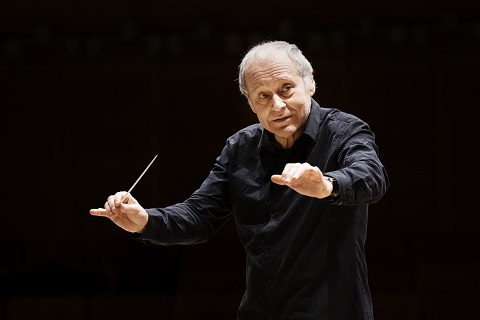08 Jan 2018
In the Beginning ... Time Unwrapped at Kings Place
Epic, innovative and bold, Haydn’s The Creation epitomises the grandeur and spirit of the eighteenth-century Enlightenment.

Epic, innovative and bold, Haydn’s The Creation epitomises the grandeur and spirit of the eighteenth-century Enlightenment.
Opening Kings Place’s new Time Unwrapped series - a project which is as bold and inventive as Haydn’s oratorio - Ádám Fischer led the Orchestra and Choir of the Age of Enlightenment, and a trio of young soloists, in a performance which proved that one doesn’t need a whole host, of angels or mortals, to celebrate the wonder and joy of God’s monumental achievement in creating the world.
This was the first time The Creation had been performed in Kings Place’s Hall One, and the small but varied instrumental forces - three flutes nestled beside the fiddles, a rich-red harpsichord dominating the centre, a splendid baroque contra-bassoon which seemed to be stretching upwards to the heavens - and sixteen-strong choir made for an impressive sight, tightly packed on the stage and in the gallery above. The first public performance of the oratorio took place on 19th March 1799 and involved a complement of 180 performers, in imitation of the large-scale performances of Handel’s oratorios that Haydn had admired during his visits to London in early 1790s. But, Fischer - who in 1987 co-founded the Haydn Festival in Eisenstadt - and his musicians turned the smaller dimensions of the venue and their own forces into a virtue. This was an intensely dramatic performance in which carefully delineated, strongly articulated musical details, vibrant colours and a vigorous dynamism created enormous energy, excitement and elation.
Moreover, with the choir aloft framed by trombones to the right and timpani and trumpets to the left, seated in the balcony I frequently felt totally immersed in the vibrant sound that Fischer conjured. There was mystery and delicacy, no more so that in the opening representation of Chaos, but there was also robustness and realism. Fischer seemed to delight in the challenging piquancy of those initial dissonances, while the resolving pronouncement, ‘Let there be Light’, was a glorious wall of blazing sound which seemed to possess veritable physical mass and tangible brightness.
The OAE instrumentalists produced grandeur when required, but played with responsiveness and suppleness. There were moments of sublimity - the grace and profundity of the lower strings’ depiction of the ‘great whales’ - and pastoral grace, as the lyrical exchanges between the flute and clarinet charmed the cattle in the meadows and fields.
 Ádám Fischer. Photo credit: Nikolaj Lund.
Ádám Fischer. Photo credit: Nikolaj Lund.
Fischer himself was a bundle of boundless, fizzing energy. Performing from memory, he frequently turned to his right to engage with his trio of archangels and enjoy their performances - I don’t think I’ve seen a conductor smile so much during a performance - while a flick of arm, wrist or hand, a raised shoulder or a twitch of baton communicated every musical nuance to his instrumentalists. He generated enormous excitement and a happiness which was powerfully embodied by the taut, disciplined vibrant heavenly chorus raising its voice in praise to tell of the glory of God when ‘Achieved is the glorious work’. Fischer’s arms circled, whipped up a storm or opened widely as if to embrace the entire ensemble; and, if his feet sometimes lost contact with the podium, they did so with a dancer’s surefootedness. When, the trumpets and timpani broke the pianissimo awe of the Fourth Day’s gradual dawn, Fischer’s pummelled his hands as if he could not contain his exhilaration at the timpanist’s heralding of the sun’s appearance over the horizon!
This season saw the OAE launch their Rising Stars of the Enlightenment initiative, selecting eight singers who will perform with the orchestra and musicians such as Sir András Schiff and William Christie, and receive coaching and tutoring. Our archangels on this occasion were, aptly, three of these first ‘rising stars’ and all gave strong, direct performances.
Bass-baritone Dingle Yandell displayed a good sense of drama in Raphael’s opening recitative, as he coloured the text to emphasise the ‘darkness’ which was ‘upon the face of the deep’ in this world without form and void. Yandell’s intonation took a little while to find a true centre, but he proved a clear and fluent story-teller, and has his voice, without undue effort, remains firm and warm at the bottom. Though a little score-bound in Parts 1 and 2, as Adam, in partnership with Charlotte Beament’s Eve, his voice relaxed and warmed in the final Part.
Beament’s soprano was strong and sure, beautifully even across the registers, and silky of tone. She climbed brightly in ‘On mighty pens uplifted soars the eagle aloft’, her account of avian invention illustrated by characterful playing by the OAE’s woodwind section. Tenor James Way made much of the text, using a tight, but not excessive, vibrato to inject the words with vitality and his voice with valour.
This was an ‘operatic’ performance, with the recitatives, arias and choruses unfolding in an unbroken sequence creating a dramatic continuity into which we were persuasively drawn (perhaps it was a pity to break such momentum by the placement of the short Part 3 after an interval?). It was surely an evening - characterised by pace, punch and panache - as exciting as that upon which the first audiences heard Haydn’s oratorio in 1799: an evening of creativity unwrapped and unbound.
Claire Seymour
Haydn: The Creation Hob.XXI:2
Charlotte Beament (soprano), James Way (tenor), Dingle Yandell (bass), Ádám Fischer (conductor), Orchestra and Choir of the Age of Enlightenment.
Kings Place, London; Saturday 6th January 2018.